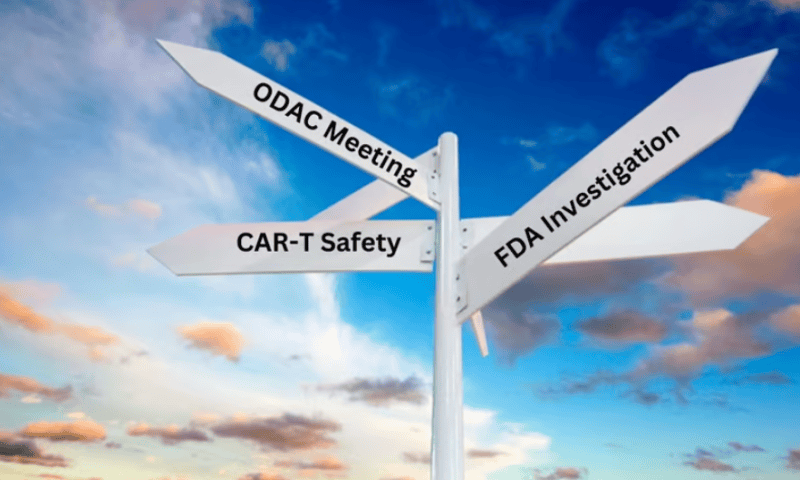A little more than a week after the FDA revealed a safety review for approved CAR-T therapies, Poseida Therapeutics is showcasing data for a Roche-partnered candidate that uses a nonviral approach and could therefore offer a better safety profile.
The early data comes from a trial of the San Diego-based biotech’s allogeneic CAR-T therapy candidate, a BCMA-targeted T stem cell memory (TSCM)-rich chimeric antigen receptor therapy called P-BCMA-ALLO1 for patients with relapsed or refractory multiple myeloma. The phase 1 data was shared at the 65th American Society of Hematology Annual Meeting and Exposition on Dec. 10.
As of Oct. 23, there were 33 evaluable patients, all of which had at least four weeks of follow up and a median of seven prior lines of therapy. The patients were split into six cohorts varying in size and received one of three lymphodepleting conditioning regimens.
An overall objective response rate (ORR) of 82% (9/11 patients) was recorded among patients in pooled P1 and P2 arms, groups that received 2×106 cells/kg of P-BCMA-ALLO1 and higher cyclophosphamide preconditioning doses at either 500 mg/m2 or 1,000 mg/m2. Both nonresponding patients, one in each arm, had received and not achieved clinical response from Johnson & Johnson’s Tecvayli, an approved BCMAxCD3 bispecific TCE antibody therapy, before receiving P-BCMA-ALLO1.
A 100% ORR was reported among nine patients in P1 and P2 groups who hadn’t received a prior BCMA-targeting bispecific TCE antibody, as well as 100% ORR in two patients who had received prior autologous CAR-T BCMA targeted therapy.
Expansion and persistence of the CAR-T cells in patients after infusion was found to depend on the conditioning dose of cyclophosphamide, with P-BCMA-ALLO1 levels in the blood much higher in the P1 and P2 arms receiving higher conditioning doses than in any of the 300 mg/m2 cohorts. Clinical responses in patients receiving the lower levels of conditioning treatment were inferior to those seen in P1 or P2 patients.
P-BCMA-ALLO1 was found to be well tolerated among evaluable patients, with no graft-vs-host disease reported at any dose level and rates of cytokine release syndrome and neurotoxicity all grade 2 or grade 1, according to Poseida.
The information is the first publicly presented dataset to provide clear clinical evidence supporting the hypothesis that TSCM cells are the ideal cell type for allogeneic CAR-T, Kristin Yarema, Ph.D., president of cell therapy and incoming CEO for Poseida, said in a Dec. 10 release. Yarema is set to take the reins from current CEO Mark Gergen at the start of 2024.
Poseida and Roche will continue enrolling for the phase 1 trial and explore other dose regimens and lymphodepleting conditioning regimens, with plans to share more data on P-BCMA-ALLO1 next year.
The asset is encompassed in a global Roche-Poseida pact that was inked last summer. Roche paid $110 million upfront and committed the same amount in near-term milestones for rights to and options on a clutch of allogeneic CAR-T programs. As the candidates advance past milestones, Roche could end up paying $6 billion, plus tiered royalties.
The early data drop follows the late November news that the FDA will investigate the “serious risk” of subsequent, secondary cancers that can occur after treatment with CART-T therapies—an announcement that sent stocks spiraling for many companies developing or marketing the therapy type.
The agency said that it received reports of T-cell malignancies—including CAR-positive lymphoma—among patients who received BCMA- or CD19-directed CAR-T immunotherapies. Some of those patients were hospitalized or later died. The events are from clinical trials as well as post-marketing surveillance programs.
Approved BCMA-directed and CD19-directed genetically modified autologous T-cell immunotherapies that use integrating vectors, such as lentiviral or retroviral vectors, already have this potential risk listed as a class-wide warning on their labels. Companies have been required to monitor patients for 15 years following treatment.
But the FDA may now take even more direct regulatory action. In announcing the review, the agency stated that the overall benefit of the approved product still outweighs the risks.
However, William Blair analysts wrote at the time that they believe the news “has no read-through to companies that use nonviral approaches for CAR insertion, such as Poseida.”
The analyst group has since dubbed the new data as “highly encouraging” and demonstrating “the most robust responses in multiple myeloma with an allogeneic CAR-T to date.”
The ORR observed is competitive with commercial autologous BCMA CAR-T therapies and BiTEs, particularly on an intent-to-treat basis, according to a William Blair Dec. 11 report (PDF). The analyst group highlighted the reduced time to treatment, lack of bridging therapy, tolerable safety profile and use in outpatient setting as characteristics that set P-BCMA-ALLO1 apart, adding that they believe the initial responses seen could deepen over time. The group also noted that the allogeneic therapy carries the potential to be readministered and possibly deepen responses that way.
The early data demonstrating allogeneic CAR-T cells traffic to the bone marrow and can differentiate into effector cells validates the biotech’s TSCM platform and sets a positive outlook for Poseida’s other allogeneic CAR-T pipeline assets, according to William Blair.
The analysts said they will look for durability and deepening of responses as more data is shared and that P-ALLO1-BCMA could be a good alternative to approved therapies Abecma or Tecvayli if it can demonstrate comparable progression-free survival rates.

